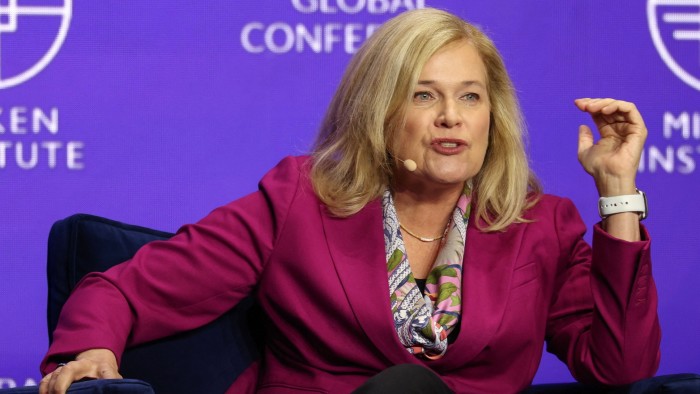Unlock the Editor’s Digest for free
Roula Khalaf, Editor of the FT, selects her favourite stories in this weekly newsletter.
Franklin Templeton is predicting a slowdown in consolidation in the investment management industry as traditional asset managers with slumping public valuations struggle to acquire faster-growing but more highly valued private capital rivals.
Jenny Johnson, chief executive of the $1.6tn in assets investment group, said a growing gap in valuations was making large mergers harder to pull off.
“I think it’s hard for anybody who hasn’t made their move already because traditional asset managers don’t trade at particularly rich multiples,” she told the Financial Times. “The alternatives managers trade at really, really rich multiples . . . It’s just hard to buy scale if you haven’t moved early, like we did.”
Franklin Templeton, which counts on public stock and bond funds for the bulk of its assets, has diversified its finances by acquiring higher-fee and faster-growing private capital firms, spurring a wave of industry consolidation.
The California-based investment group has in recent years acquired Lexington Partners, a large buyer of second-hand private fund stakes, and private credit groups Benefit Street Partners and Alcentra. Rivals including BlackRock, T Rowe Price and Nuveen have also spent billions on takeovers to solidify their own presence in lucrative private markets.
Many of these asset management giants including Franklin Templeton are now forming partnerships with private capital groups, instead of spending on acquisitions. The firm will push into infrastructure investments by creating formal partnerships with three large specialist investors in the sector after struggling to identify viable acquisitions.
On Tuesday it will announce an infrastructure investment partnership with DigitalBridge, a leading investor in data centres and fibre networks, Copenhagen Infrastructure Partners, one of Europe’s leading investors in the sector, and Actis, the sustainable infrastructure business owned by General Atlantic.
No equity will change hands but the firms will co-operate on deals targeting digital infrastructure, renewable energy and power markets, among others.
The partnership underscores how traditional asset managers can gain exposure to harder-to-source private infrastructure deals without having to spend heavily on takeovers.
“Scale really matters in the infrastructure space,” said Johnson, a sector in which he said the firm had been “a bit challenged on trying to think about how we would be able to acquire someone and try to compete.”
The private capital groups partnering with Franklin Templeton believe the tie-up will help them manage money for potentially millions of the asset manager’s customers, sidestepping the need to build giant internal sales and distribution teams to reach wealthy individual investors.
“Franklin Templeton did a great job putting together a set of complementary partners to create an exciting investment offering for individual investors,” Bill Ford, General Atlantic chief executive, told the FT.
Many private capital groups have tied future growth to managing money for wealthy individual investors and retirement savers, as institutional investors slow their pace of new investment in private funds. But they are reluctant to spend on the sales and marketing infrastructure needed to manage money for these smaller investors.
A flurry of recent tie-ups between traditional asset managers and private capital groups including KKR and Capital Group, Partners Group and BlackRock, and Goldman Sachs and T Rowe Price, signals that the biggest players in the industry view co-operative partnerships as a cheaper, less risky way to grow.
“In many ways it’s kind of even better than acquiring,” said Johnson.




